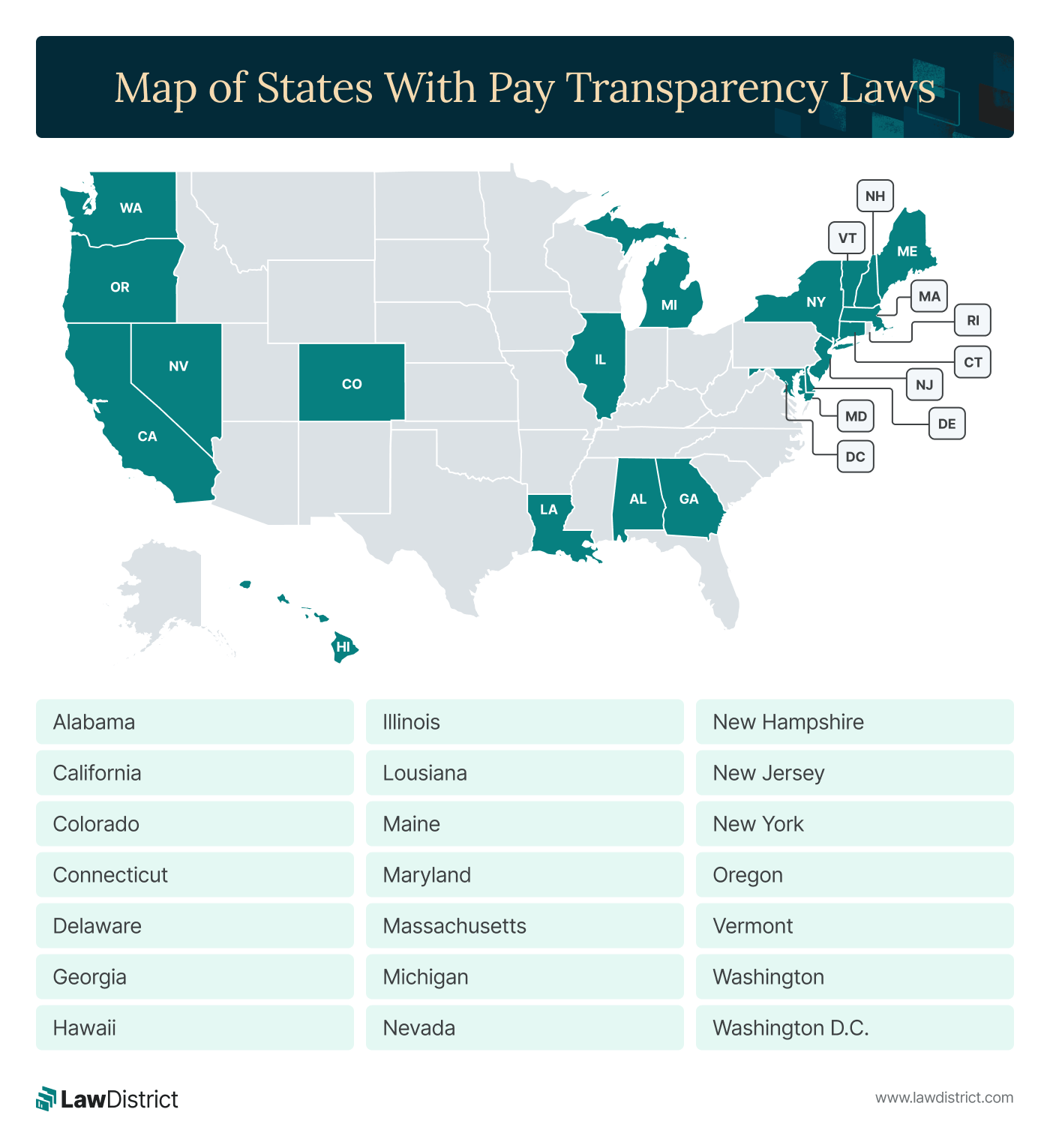There is a growing trend of lawmakers and employees working together to enact laws enhancing employee rights on pay transparency. Employers are obliged to disclose salary ranges and benefits under these laws.
In some jurisdictions, employers must provide salary ranges when posting jobs. In others, employees must be given salary ranges when they request them, when switching jobs, and when being hired.
Some U.S. jurisdictions already have pay transparency laws, and more could follow. It is important to note that each jurisdiction handles these requirements differently.
Pay transparency laws may also protect employees' right to receive information about their compensation and that of their colleagues without fear of retaliation. Furthermore, these laws aim for transparency and fairness. In particular, preventing pay discrimination based on race, gender, and other protected classes.
Key points of pay transparency laws
- Salary range disclosure: Employers are required to disclose salary ranges in job postings and to current or prospective employees under certain conditions.
- Protection against retaliation: Employees can discuss or inquire about their own or their colleagues' compensation without fear of retaliation from their employer.
- Aim for fairness: The laws seek to ensure transparency and fairness in compensation, aiming to eliminate pay discrimination based on race, gender, or other protected characteristics.
The Evolution of Pay Transparency Laws
The move towards pay transparency marks a significant change in employment law and workplace norms. Traditionally, salary discussions were taboo, and companies kept pay scales secret, contributing to wage disparities, especially among women and minorities.
Early on, pay transparency's roots were in labor movements and minimum wage laws, but real strides in pay equity came with the Equal Pay Act of 1963, outlawing unequal wages for the same job across genders.
Legislation expanded to address not just gender but also race, ethnicity, and more, with the Civil Rights Act of 1964, Title VII, banning employment discrimination and paving the way for broader pay transparency laws.
Recently, states like California, Colorado, and New York have introduced laws mandating salary range disclosures in job listings and to employees, aiming to enhance compensation fairness.
The growth of pay transparency laws signals an increasing emphasis on workplace equity. As these laws evolve, employers must adapt to ensure compliance and support a fairer workplace. This ongoing journey towards transparency continues to build on past progress, promising a fairer future in employment practices.
What Is Pay Transparency?
Federal law defines pay transparency as an employer's willingness to disclose salary and pay information. In addition to salary transparency, salary records can also be easily accessed by employees at their workplaces.
Inequitable pay exists. Women, as well as individuals who are black, indigenous, and people of color (BIPOC), are disproportionately affected. Inequitable pay exists. Women, as well as individuals who are black, indigenous, and people of color (BIPOC), are disproportionately affected. In 2020, women earned 83 cents for every dollar a white man earned. In 2022, women earned 82 cents for every dollar a white man earned. But the situation is not the same for all women. As a result, pay transparency has emerged as a way to address pay inequities in the workplace.
Key aspects of pay transparency
- Purpose: To mitigate wage disparities and promote equity in the workplace.
- Impact on equity: Targets the reduction of pay gaps, particularly affecting women and BIPOC individuals.
- Federal definition: Emphasizes employer transparency in sharing pay information.
- Cultural shift: Encourages a workplace culture where salary discussions are open and free from retaliation.
How Does Pay Transparency Work?
You don't have to create a spreadsheet with the salaries of each employee to ensure pay transparency. For example, discrepancies can be identified through payroll audits or proactive dialogue between managers and employees.
According to PayScale, pay transparency is measured on a spectrum. Several approaches can be used to implement pay transparency within an organization, depending on its needs and goals. Transparency can be achieved in several ways, including:
- Provide equal salary ranges for each position within your organization: Employees will better understand the potential earnings for different roles, preventing pay disparities due to factors such as race and gender.
- Explaining how pay is computed: The factors can include experience, education, performance, and others. Providing employees with this information can help them understand how income is determined and provide a basis for career advancement discussions.
- Regularly auditing pay equity: The goal is to identify pay disparities based on protected characteristics, such as race, gender, and age, by analyzing equal pay data.
- Establishing an open pay policy: This involves openly sharing salary information among employees, so everyone knows how much they earn.
Local employers must provide pay transparency in some cities and states. The city of New York, for example, requires employers to post a salary range for each job listing, employee promotion, or transfer. However, an employer in California is only necessary to provide a pay range after an interview has taken place.
Ensuring Compliance in Salary and Pay Disclosure
Adhering to salary disclosure laws is crucial for employers to ensure transparency and equity in compensation. These laws require clear communication of salary ranges in job postings and to employees, emphasizing the importance of pay disclosure compliance.
Key employer obligations
- Provide accessible salary information in job listings.
- Share compensation practices and determinations with employees.
Consequences of Non-Compliance
Failing to comply can lead to legal penalties, damage to reputation, and a negative impact on employee morale. Employers need to conduct regular pay practice audits to ensure adherence and address disparities proactively.
Benefits of Compliance
Beyond avoiding penalties, embracing transparency in pay practices builds trust, enhances company reputation, and supports a fair workplace culture.
In essence, compliance with salary disclosure laws is not just about meeting legal requirements, but rather about fostering a transparent and equitable work environment.
Legal Actions for Pay Transparency Violations: A Guide for Employees
An employee who believes their employer violated a pay transparency law might be able to seek legal remedies, such as damages or injunctive relief. A study published by Beqom in 2022 suggests that 60% of employed Americans will switch companies if there is a more transparent pay structure.
According to the survey, more than a third of U.S. workers do not share gender pay gap data internally or externally, while 22% believe the gap has grown since last year. The employee's rights may differ based on the state where they work and the specific laws in place. But a pay transparency law may give employees the following rights:
- The right to know how their salary is determined and what the salary range is for their position
- The right to access their pay, as well as the pay of their co-workers, without fear of persecution
- The right to complain about pay transparency violations to the appropriate enforcement agency
- Non-discrimination language according to 41 CFR Part 60-1
Pay Transparency Across the U.S.: Laws and Regulations by State
As mentioned previously, the pay transparency requirements vary greatly depending on the state. Here is a map showing which states have their own laws and which do not:

If you would like to see a more detailed summary of each state that does have pay transparency laws, they are listed below, along with a brief description of the level of transparency required by law.
| State
|
Summary of Pay Transparency Laws
|
| Alabama
|
Clarke-Figures Equal Pay Act: An employer may not retaliate against an applicant who refuses to provide their salary history or terminate them if they do
|
| California
|
Equal Pay Act: Salaries must be provided by employers, and salary history cannot be requested. A pay scale for an employee's current position must be provided upon request to employers with 15 or more employees under Senate Bill 1162.
|
| Colorado
|
Equal Pay for Equal Work Act: A job posting in Colorado must now disclose hourly or salary compensation, benefits, and other forms of payment. Colorado employers who hire at least one employee live under the law, as do employers who hire remote workers.
|
| Connecticut
|
Salary Range Disclosure Act: Employers are required to offer salary ranges to job seekers upon request or before the time of an offer. When hiring an employee, changing the employee's position, or when the employee first requests it, employers must provide wage range information.
|
| Delaware
|
House Bill 1: Employers and applicants can be asked about an applicant's salary history. It is permissible for employers to verify salary history after an employment offer has been extended and accepted.
|
| Georgia
|
A job applicant or interviewer won't be asked for salary history during a job interview or screening in Atlanta. (City agencies)
|
| Hawaii
|
B. 235: When determining compensation during the hiring process, employers may not inquire about applicants' salary history.
|
| Illinois
|
101-0177: Candidates are not permitted to discuss their compensation history with employers. City departments are no longer allowed to ask about applicants' salary histories following an order issued in 2018.
|
| Louisiana
|
Equal Pay for Women Act: Inquiring about, disclosing, comparing, or otherwise discussing an employee's wages or the wages of other employees shall not result in discrimination, retaliation, or adverse employment action by an employer. La. Rev. Stat. Ann. § 23:644(D).
|
| Maine
|
LD278: Through an employment agency, employers may not ask candidates about their past or current salary history. Furthermore, employers cannot restrict employees from sharing their own wages or asking about another employee's compensation, or disclosing it.
|
| Maryland
|
Equal Pay for Equal Work Law–Section 3-304.1: Inquiring About, Discussion, or Disclosure of Wages
|
| Massachusetts
|
Equal Pay Act (MEPA): Neither employers nor candidates may be screened based on salary history. An employer may confirm a candidate's prior wage history if they voluntarily provide it or have been extended an offer of employment.
|
| Michigan
|
Mich. Comp. Laws § 408.483a(1)(a)-(c): An employer shall not: require as a condition of employment non-disclosure of employees' wages; require employees to sign documents denying them the right to disclose wages; or dismiss, discipline, or discriminate against employees who disclose their wages.
|
| Nevada
|
Nev. Rev. Stat. § 613.330(1)(c): General Anti-Discrimination Law: It is unlawful for certain employers to discriminate against any employee because the employee has inquired about, discussed, or voluntarily disclosed their wages or the wages of another employee.
|
| New Hampshire
|
N.H. Rev. Stat. Ann. § 275:38-a(I)(b): Employees shall not be terminated or treated unfairly by their employers for asking about, discussing, or disclosing their wages. \
N.H. Rev. Stat. Ann. § 275:41-b(I)-(II): An employer cannot restrict an employee's right to disclose the amount of their wages as a condition of employment or require them to sign a waiver that denies them that right; additionally, employers cannot terminate, discipline, or discriminate against employees who disclose compensation.
|
| New Jersey
|
N.J. Stat. Ann. § 10:5-12(r): Employers are prohibited from taking reprisals against employees who ask, discuss, or disclose to any other employee or former employee of the employer. Employees or applicants may be required to sign waivers or agree not to make requests or disclosures as a condition of employment or to require employers to obtain information about the compensation of any employee or former employee
|
| New York
|
N.Y. Lab. Law § 194(4)(a)-(b): Employees are not prohibited from asking, discussing, or disclosing their wages or that of another employee; however, employers may limit when, where, and how they can inquire about, discuss, or disclose wages at their workplaces and workdays
|
| Oregon
|
Or. Rev. Stat. § 659A.355(1)(a): Dismissing, demoting, suspending, discriminating against, or retaliating against an employee for asking about, discussing, or disclosing in any way about their wages or the wages of another employee, is unlawful employment practice
|
| Vermont
|
Vt. Stat. Ann. tit. 21, § 495(a)(7)(B)(i)(I)-(II): It is unlawful for an employer or a subordinate to require an employee to refrain from disclosing their wages or to inquire about or discuss the wages of other employees. It is also forbidden for employers to require employees to sign waivers that restrict their ability to disclose their wages or inquire about the salaries of other employees.
|
| Washington
|
Wash. Rev. Code Ann. § 49.58.040(1)(a)-(b): Employees may not be required by their employer to keep their wages confidential or to sign a waiver or other document that prevents them from disclosing their wages. Discharges or retaliation are prohibited if an employer inquires about, discloses, or discusses an employee's wages or the wages of others.
|
| Washington D.C.
|
Starting on June 30, 2024, any employer that has at least one employee in D.C. must include salary ranges in their job advertisements and inform candidates about the availability of healthcare benefits before conducting the first interview.
|
Whether you are an employer or an employee, make sure you know the rights in this important aspect of employment to follow the laws applicable in your state.
Navigating Employment Contracts with Pay Transparency in Mind
Understanding the intricacies of pay transparency laws is crucial for both employers and employees. Employers need to craft contracts that not only meet legal requirements but also promote fairness and transparency in the workplace.
If you're looking to ensure your employment contracts are up-to-date with the latest pay transparency laws, consider using our Employment Contract template.
Start your Employment Contract now
Helpful Resources:
U.S. Department of Labor - Pay Transparency Regulations Frequently Asked Questions
PayScale - What is Pay Transparency?
Beqom - Job Seekers Are Easily Swayed Into New Roles



